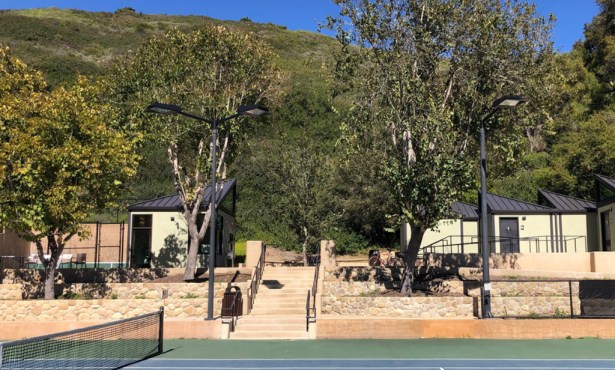The Laws of Gravitas
Wine Consultant Jeff Newton Talks Shop
by Sao Anash
Ask any winemaker in Santa Barbara County to name the most
respected vineyard consultant they know, and most will answer Jeff
Newton of Coastal Vineyard Care. For years, Newton has consulted
for multiple esteemed vineyards. He is known for being a
perfectionist, level-headed, and a master at understanding the
nuances of the grapevine. Not long ago, I had the opportunity to
hike through the Gaia vineyard, in Santa Rita Hills, with Newton.
He was relaxed in the vineyard, yet knowledgeable, alert, and
insightful.
What’s a typical day like for you, when you’re visiting a
client’s property? A typical day would start with a 5 a.m. wake-up.
By 6 a.m. I would be on the phone with my partner and vineyard
supervisors discussing the day’s projects and any problems we might
be having. By 7 a.m. and for the entire morning, I’m in the field
checking vineyards on an ATV or working with my crews and their
crew foreman on whatever hand projects might be going on.
Afternoons are spent strategizing with my staff, meeting with
clients, or working with winemakers about irrigation issues,
crop-size targets, grape purchases, and planning new vineyard
blocks.
When I started in the wine business, about 20 years ago, you
didn��t hear a lot about vineyard consultants. Is this a more recent
phenomenon, and, if so, why do you think that is? While 20 years
ago there were not the number of consultants you encounter today,
there was the famous André Tchelistcheff. Tchelistcheff was born in
Russia, learned winemaking in France, and later made wine in the
Napa Valley at Beaulieu Vineyard. During the ’70s and ’80s he
worked as a consultant to many California wineries. Today, you will
find many consultants in the wine industry. Some specialize in
winemaking and others in grape growing. For grape growers, there is
further specialization. Some consultants focus on soil evaluations,
others on specific grape growing or viticultural techniques, still
others on organic or biodynamic farming.
Though you work with other varietals, what is it like working
with pinot noir, chardonnay, and syrah? It’s pure pleasure working
with these three varietals because in S.B. County these varietals
can produce such thrilling wines. Each variety has its own
challenge. The temperamental pinot noir needs very cool growing
conditions and particular soils. Chardonnay is very susceptible to
the fungal disease powdery mildew. Syrah is difficult because of
the baffling “syrah disorder” that no one quite understands but can
turn leaves red and can reduce wine quality.
In laymen’s terms, can you talk about why the introduction of
new and/or different clones has been important to the production of
better wines? Grapevines are all propagated from cuttings, not from
seeds. You’d think that vines propagated from cuttings of the same
vine would all be the same, and they are for a while. However,
throughout time genetic mutations can take place that will change
the vine characteristic slightly. The leaf shape or the cluster
size may be slightly different. Most importantly the flavor can be
slightly different. If you have different clones of pinot noir, the
vines are still identifiably pinot noir, but the flavors or color
or tannins may differ a little bit. This is good for winemakers
because they will have more flavors to choose from when blending
the wine and the result mostly likely will be more complex and
interesting wine.
How do you feel about biodynamic farming and organic farming
practices? Do they lead to better wines, or is that even the goal?
Is stewardship the goal? Ever since my first farming experience in
1980, I have been interested in alternative farming practices;
practices that would reduce pesticide use and the hazard to our
farmworkers, our neighbors, and the environment. It’s been slow in
coming but most of our vineyards are now sustainably farmed. Others
are organically or biodynamically farmed. Ultimately the real
reason we farm in a sustainable, organic, or biodynamic fashion is
to make the farm, and the wine from the farm, safer.
What are the most challenging times of year in the vineyard?
Every time of year presents its own challenges. What’s great about
agriculture is that as the seasons change, so does the work. Every
year is a little different. More rain one year, less sun the next.
It all impacts the work schedule and the type of work we do.
Probably the most demanding time is harvest. We sell to around 80
different wineries and harvest thousands of tons of fruit. The
logistics are unbelievable. Moving large numbers of people and
machinery into position with 24 hours notice makes for one giant
adrenaline rush.



